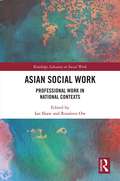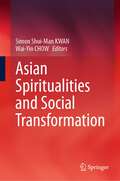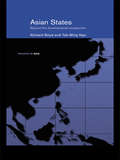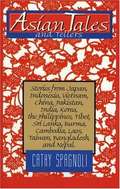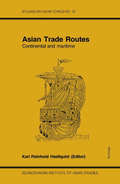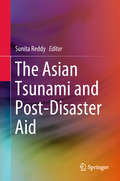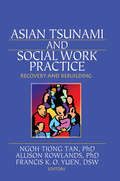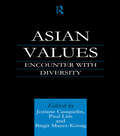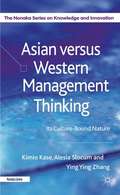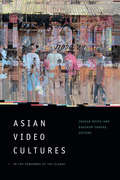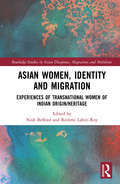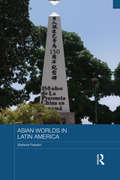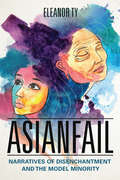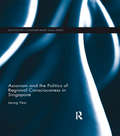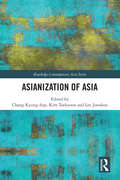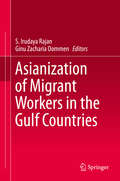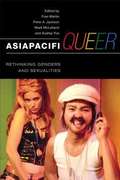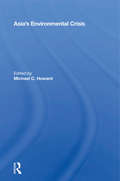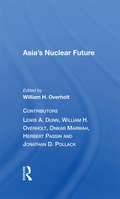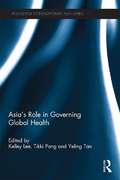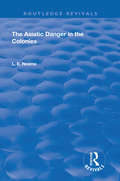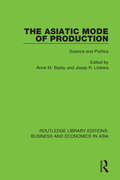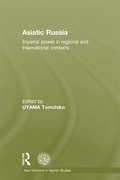- Table View
- List View
Asian Social Work: Professional Work in National Contexts (Routledge Advances in Social Work)
The countries of East and Southeast Asia, taken as a whole, display a laboratory of social and political conditions, with individual countries presenting a variety of political, cultural and social characteristics. Some with one-party state systems, others with stable liberal democracies and yet others with more fragile democratic systems. As such the region presents a unique opportunity to examine the relationship between diverse national environments and social work education regimes. In this book, social work educators and theorists from around East and Southeast Asia provide accounts of the social work programs within the higher education systems of their respective countries and compare them to those of their neighbours. This is the first book to offer a structured account of how social work and social work education have emerged and finds their present place in the historical, economic, political, urban/rural and higher education contexts of Southeast Asia and East Asia. Experts from the region assess the extent to which these countries’ systems possess a collective coherence, while examining the diversity among them.
Asian Spiritualities and Social Transformation
by Simon Shui-Man KWAN Wai-Yin ChowThis book offers a cross-cultural and inter-religious understanding of the ways social transformation in Asia is related to Asian spiritualities. Bringing together scholars and practitioners from different cultures and fields of study, it collates cutting-edge research and applies it to the role of Asian spiritualities in social transformation. Spirituality has garnered increasing attention in recent years across diverse fields of research and practice, from psychology and healthcare, to anthropology, education, sociology, political sciences, social work, feminist studies, cultural studies, religious studies, theology, philosophy, and so on. However, the term means different things within these different disciplines. Spirituality can be understood to be private and personal, but also public and societal, not only as a force that brings about change but also one that helps maintain the status quo – not only as a core element in religion but also as something disconnected from it. This book poses that to gain a firm grasp of spirituality, one needs to traverse these different terrains. Disbarring the orientalist understanding of spirituality that is often found embedded in stereotypes of the East as mystical, esoteric, and spiritual, in contrast to the West as scientific and rational, this book deconstructs this binarism to enable a sophisticated understanding of the diversity within Eastern and Western spiritualities. It presents “Asian spirituality” as a misnomer, focusing on the plurality of spiritualties and the region’s multifaceted religiosity, and it also excavates interfaith terrains. It is of interest to social scientists, theologians and religious scholars, and students and researchers interested in Asian spiritualties and social movements
Asian States: Beyond the Developmental Perspective (Politics in Asia)
by Richard Boyd Tak-Wing NgoA team of international leading experts provide a much needed re-examination of the theoretical claims and the empirical foundation of developmental state theory. Asian States argues that regardless of the merits of the developmental state as an explanation of economic growth, it falls far short of being an adequate theory of the state in Asia. The contributors critically review claims about agency, state-society and state-market relations that shape developmental projects. It broadens the analysis of state involvement in developmental projects and considers the variety of political and social bases for state projects across East and Southeast Asia in a theoretically sensitive, thematic and empirically rich way.
Asian Tales And Tellers
by Cathy SpagnoliIn this abundant and kaleidoscopic collection, Spagnoli includes stories from Japan, India, Korea, Vietnam, Cambodia, the Philippines, Bangladesh, Laos, Tibet, Pakistan, Sri Lanka, China, Indonesia, Taiwan, Burma, and Nepal. After profiling modern Asian storytellers practicing traditional storytelling styles, she arranges the stories around dominant Asian themes such as Harmony and Friendship
Asian Trade Routes (Nias Ser.)
by Karl Reinhold HaellquistFirst Published in 2004. These essays deal with the Western penetration of Asia from the earliest times to the recent past in the quest for trade, and by means of opening up routes and communications to bridge East and West, thereby influencing societies, economies and cultures. The relevant sections cover West Asia, Central Asia and Afghanistan, South Asia, Southeast Asia, and East Asia.
The Asian Tsunami and Post-Disaster Aid
by Sunita ReddyThrough the lens of the Asian tsunami, this book problematizes concepts that are normally taken for granted in disaster discourse, including relief, recovery, reconstruction and rehabilitation. The unprecedented flow of humanitarian aid after the Asian tsunami, though well-intentioned, showed adverse effects and unintended consequences in the lives of people in the communities across nations. Aid led not only to widespread relief and recovery but also to an exacerbation of old forms of inequities and the creation of new ones arising from the prioritization, distribution and management of aid. This, in turn, led to the incongruity between the needs and expectations of the affected and the agendas of aid agencies and their various intermediaries. This book examines the long-term consequences of post-disaster aid by posing the following questions: What has the aid been expended on? Where has the aid primarily been expended, and how? And what were the unintended consequences of post-disaster aid for the communities? This topical volume is of interest to social scientists, human rights and law researchers and environmental scientists interested in disaster studies.
Asian Tsunami and Social Work Practice: Recovery and Rebuilding
by Ngoh Tiong Tan Allison Rowlands Francis K. O. YuenAsian Tsunami and Social Work Practice presents an inside look at the complicated nature of disaster preparedness and how it relates to poverty, trauma, community development, and service delivery systems. Health, human services, and mental health professionals from countries still reeling from the devastations of the Asian Tsunami of 2004 reflect on the challenges facing survivors, the effects of the disaster, and interventions by the community and social work professionals. This unique book offers real-life accounts of practice models and the experiences of recovery from natural and man-made events.When disaster strikes, social workers and other human service professionals not only are the first responders, they are also called upon to help victims with the effects of trauma and displacement, providing social and emotional support in the recovery and rebuilding of families and communities. Asian Tsunami and Social Work Practice explores social interventions used in relief efforts to aid hundreds of thousands of people who were left at risk and in need in affected areas of South Asia and East Africa, including Thailand, Sri Lanka, India, Singapore, and Indonesia.Asian Tsunami and Social Work Practice examines: mental health practice in emergency response the connections between disability and disaster social and physical conditions after the tsunami of 2004 state and civil society responses in India service delivery frameworks the effective use of volunteers training programs for social workers and recovery workers the economic, social, and psychological impacts on survivors and much moreAsian Tsunami and Social Work Practice is an invaluable aid for students, practice professionals, and educators in health and human services, as well as anyone working in international aid and disaster relief.
Asian Values: Encounter with Diversity
by Josiane Cauquelin Paul Lim Birgit Mayer-KönigThis book opens with an examination of values themselves, grappling with western assertions of individual human rights and the eastern emphasis on duties, and analysing selected Asian philosophical and religious traditions. Several case studies follow, on countries the Philippines, Japan, China, Malaysia and Thailand. The purpose of the book is to help westerners in particular to understand and appreciate better the changes taking place in Asia, to handle relations more sensitively, and thereby to help bring Europe and Asia together.
Asian versus Western Management Thinking
by Kimio Kase Alesia Slocum Ying Ying ZhangExplores the extent to which the theories of management are universally applicable principles and to what extentthey are specific to particular cultural, national and temporal contexts. "
Asian Video Cultures: In the Penumbra of the Global
by Joshua Neves Bhaskar SarkarThe contributors to this volume theorize Asian video cultures in the context of social movements, market economies, and local popular cultures to complicate notions of the Asian experience of global media. Whether discussing video platforms in Japan and Indonesia, K-pop reception videos, amateur music videos circulated via microSD cards in India, or the censorship of Bollywood films in Nigeria, the essays trace the myriad ways Asian video reshapes media politics and aesthetic practices. While many influential commentators overlook, denounce, and trivialize Asian video, the contributors here show how it belongs to the shifting core of contemporary global media, thereby moving conversations about Asian media beyond static East-West imaginaries, residual Cold War mentalities, triumphalist declarations about resurgent Asias, and budding jingoisms. In so doing, they write Asia's vibrant media practices into the mainstream of global media and cultural theories while challenging and complicating hegemonic ideas about the global as well as digital media. Contributors. Conerly Casey, Jenny Chio, Michelle Cho, Kay Dickinson, Bishnupriya Ghosh, Feng-Mei Heberer, Tzu-hui Celina Hung, Rahul Mukherjee, Joshua Neves, Bhaskar Sarkar, Nishant Shah, Abhigyan Singh, SV Srinivas, Marc Steinberg, Chia-chi Wu, Patricia Zimmerman
Asian Women, Identity and Migration: Experiences of Transnational Women of Indian Origin/Heritage (Routledge Studies in Asian Diasporas, Migrations and Mobilities)
by Nish Belford Reshmi Lahiri-RoyThis book explores the influence which education and migration experiences have on women of Indian origin in Australia and the United Kingdom when (re)negotiating their identities. The intersections of migration and transnationalism are critically examined through multiple theoretical lenses across three thematic domains encompassing socio-historical discourses, postcolonial theory, theories on intersectionality and interceptionality, emotional reflexivity and affects. In doing so, the book highlights the ambiguities around gendered access and equity to education, migration experiences, the acculturation process, dilemmas surrounding transnationality and negotiation of identities, belonging and struggles inherent in simultaneously maintaining ties with home and new social fields. Chapters highlight the practical, methodological, and substantive aspects of affective dimensions and voice with a critical understanding of different tensions, challenges, complexities and conflicts underlining the stories. The book raises the question of voice and agency in advocating emotion-based writing in recalibrating conditions representing gendered subjective multivocality of women in breaking silences. Presenting non-Western perspectives through fragmented and often marginalised accounts within transnational and global spaces, this book will be of interest to researchers in the fields of Sociology, Gender Studies, Migration, Transnational and Diaspora studies, Sociology of Education, Feminist Studies, Cultural Studies, Literature and Cultural Geographies.
Asian Worlds in Latin America (Routledge Advances in Asia-Pacific Studies)
by Stefania PaladiniThere has been increasing Asian interest in Latin America in recent years, beginning with Japanese investment in the 1980s, and continuing into the present decade when there is growing investment by China. This book examines the nature and extent of Asian business and related activity in Latin America. It shows how investment is not just from Japan and China, with Korea and India also involved, and with Taiwan directly competing with China. It explores activity in the minerals and energy sector, and also in trade and other areas. It demonstrates how Asian activity has a wide impact on the countries of both South America and the Caribbean, making them less exclusively "the United States’ backyard"; how different countries are affected differently by Asian activity; and how the growing links with Asia increasingly open up the possibility of greater Latin American activity in Asia.
Asianfail: Narratives of Disenchantment and the Model Minority
by Eleanor TyEleanor Ty's bold exploration of literature, plays, and film reveals how young Asian Americans and Asian Canadians have struggled with the ethos of self-sacrifice preached by their parents. This new generation's narratives focus on protagonists disenchanted with their daily lives. Many are depressed. Some are haunted by childhood memories of war, trauma, and refugee camps. Rejecting an obsession with professional status and money, they seek fulfillment by prioritizing relationships, personal growth, and cultural success. As Ty shows, these storytellers have done more than reject a narrowly defined road to happiness. They have rejected neoliberal capitalism itself. In so doing, they demand that the rest of us reconsider our outmoded ideas about the so-called model minority.
Asianism and the Politics of Regional Consciousness in Singapore: Asianism And The Politics Of Regional Consciousness In Singapore (Routledge Contemporary Asia Series)
by Leong YewOver the last two decades, Singapore has undergone a substantial degree of ‘Asianization’. Apart from participating in the Asian values debate of the 1990s, re-visioning itself as ‘New Asia’ and a global-Asian hub, and establishing Asian identities for the commodities it consumes and produces, Singapore has also repurposed its modernity, cultures, and ethos along similar regionalist precepts. However, even in recent times, Singapore continues to vacillate ambivalently between identifying with and differentiating itself from Asia. Responding to the challenges Singapore faces in coming to terms with its Asian identity, this book examines the complex cultural, social, and political underpinnings that have shaped Singapore’s mainstream discourse on Asia. Indeed, it argues that its legacy as a colonial port city, the exigencies of managing the post-independence nation state, and the larger forces of imperialism and capitalism all contribute to its politics of Asianism. Taking a thoroughly interdisciplinary approach that spans history, cultural studies, postcolonialism, and cultural geography, Leong Yew reveals how Asia has been used to narrate Singapore’s beginnings, revalidate Singaporean ethnic culture and to consolidate its practices of consumption and commodification. This book will be welcomed by students and scholars working across a range of fields, including Asian culture and society, Asian politics, cultural theory and postcolonial studies.
Asianization of Asia (Routledge Contemporary Asia Series)
by Chang Kyung-Sup Kim Taekyoon Lee JoonkooThis book explores the Asianization of contemporary Asia, a trend that through neoliberal economic globalism has diluted the political effect of the EuroAmerican-dictated segmentation of Asia and instead facilitated and accelerated socioeconomic exchanges and collaborations among Asian nations themselves.It comprehensively analyzes and interprets Asia’s Asianization in terms of intensification of intra-Asian interactions and flows in industrial, educational, sociopolitical and ecological spheres. Through such explorations, the book successfully reveals that Asia’s Asianization is particularly reflected in the major dimensions of regional industrial integration, transnational class relations, labor market regionalization, international educational mobility, regionalization of media and pop culture, transnational social movements and activisms, regionalized social governance for development cooperation and developmental mobilization of diasporic socioeconomic resources.In particular, as an interdisciplinary study of Asia's industrial, social and cultural integration within and across Asian societies in both outbound and inbound directions, this book will be of huge interest to students and scholars of Asian politics, development and sociology.
Asianization of Migrant Workers in the Gulf Countries
by S. Irudaya Rajan Ginu Zacharia OommenThis edited volume contains sixteen chapters by eminent scholars on one of the largest migration corridors in the world i.e., between South and South-East Asia and the Gulf region. Asia’s trade and cultural contact with the Gulf date back to ancient historical times. Since the 1970s, the economic rise of the Gulf Cooperation Council (GCC) countries owing to the discovery of oil has inspired a huge influx of migrant workers from Asia. At present, out of roughly 15 million expatriates in the Gulf region, Asians constitute around 12 million (80 percent). The chapters in this book look at migration from countries like India, Sri Lanka, Bangladesh, Pakistan, Indonesia and Philippines to the different GCC countries. A few chapters also focus on migration from the India state of Kerala- a state where migration to the Gulf is prominent and where remittances make up over 36 percent of the state GDP. Furthermore, the issues covered range from labour practices and policies, citizenship and state protection, human rights, gender and caste as well as diaspora. This book explores the multifaceted nuances of the ‘Asia-Gulf migratory corridor’ and unearths future prospects and strategic implications. The book examines remittance behaviour, changing gender roles of immigrants, social-spatial mobility, migrant policies, human rights, sense of belonging and identity and perception, and the interaction between nationals and non-nationals. The book will be of interest to researchers in the areas of demography, migration and gender studies as well as social science researchers, policy makers, human rights lawyers, civil society institutions working on migration, Gulf studies programmes and centres on South-Asian and Middle-Eastern studies.
Asians on Demand: Mediating Race in Video Art and Activism
by Feng-Mei HebererDoes media representation advance racial justice? While the past decade has witnessed a push for increased diversity in visual media, Asians on Demand grapples with the pressing question of whether representation is enough to advance racial justice. Surveying a contemporary, cutting-edge archive of video works from the Asian diaspora in North America, Europe, and East Asia, this book uncovers the ways that diasporic artists challenge the narrow—and damaging—conceptions of Asian identity pervading mainstream media. Through an engagement with grassroots activist documentaries, experimental video diaries by undocumented and migrant workers, and works by high-profile media artists such as Hito Steyerl and Ming Wong, Feng-Mei Heberer showcases contemporary video productions that trouble the mainstream culture industry&’s insistence on portraying ethnic Asians as congenial to dominant neoliberal values. Undermining the demands placed on Asian subjects to exemplify institutional diversity and individual exceptionalism, this book provides a critical and nuanced set of alternatives to the easily digestible forms generated by online streaming culture and multicultural lip service more broadly. Employing feminist, racial, and queer critiques of the contemporary media landscape, Asians on Demand highlights how the dynamics of Asian representation play out differently in Germany, the United States, Taiwan, and Spain. Rather than accepting the notion that inclusion requires an uncomplicated set of appearances, the works explored in this volume spotlight a staunch resistance to formulating racial identity as an instantly accessible consumer product.
Asians Wear Clothes on the Internet: Race, Gender, and the Work of Personal Style Blogging
by Minh-Ha T. PhamIn the first ever book devoted to a critical investigation of the personal style blogosphere, Minh-Ha T. Pham examines the phenomenal rise of elite Asian bloggers who have made a career of posting photographs of themselves wearing clothes on the Internet. Pham understands their online activities as "taste work" practices that generate myriad forms of capital for superbloggers and the brands they feature. A multifaceted and detailed analysis, Asians Wear Clothes on the Internet addresses questions concerning the status and meaning of "Asian taste" in the early twenty-first century, the kinds of cultural and economic work Asian tastes do, and the fashion public and industry's appetite for certain kinds of racialized eliteness. Situating blogging within the historical context of gendered and racialized fashion work while being attentive to the broader cultural, technological, and economic shifts in global consumer capitalism, Asians Wear Clothes on the Internet has profound implications for understanding the changing and enduring dynamics of race, gender, and class in shaping some of the most popular work practices and spaces of the digital fashion media economy.
AsiaPacifiQueer: Rethinking Genders and Sexualities
by Audrey Yue Peter Jackson Fran Martin Mark MclellandThis interdisciplinary collection examines the shaping of local sexual cultures in the Asian Pacific region in order to move beyond definitions and understandings of sexuality that rely on Western assumptions. The diverse studies in AsiaPacifiQueer demonstrate convincingly that in the realm of sexualities, globalization results in creative and cultural admixture rather than a unilateral imposition of the western values and forms of sexual culture. These essays range across the Pacific Rim and encompass a variety of forms of social, cultural, and personal expression, examining sexuality through music, cinema, the media, shifts in popular rhetoric, comics and magazines, and historical studies. By investigating complex processes of localization, interregional borrowing, and hybridization, the contributors underscore the mutual transformation of gender and sexuality in both Asian Pacific and Western cultures. Contributors are Ronald Baytan, J. Neil C. Garcia, Kam Yip Lo Lucetta, Song Hwee Lim, J. Darren Mackintosh, Claire Maree, Jin-Hyung Park, Teri Silvio, Megan Sinnott, Yik Koon Teh, Carmen Ka Man Tong, James Welker, Heather Worth, and Audrey Yue.
Asia's Environmental Crisis
by Michael C. HowardThis book focuses on the political economy of the environment in Asia, examining the economic and political forces that have generated the problems, the political efforts to find solutions, and the economic and political contexts of proposed solutions.
Asia's Nuclear Future/h
by William H. OverholtFuture historians are very likely to see nuclear proliferation—or the averting of nuclear proliferation—as one of the central determinants of international politics in the last quarter of the twentieth century. Certainly the development of an independent nuclear deterrent by the People's Republic of China and the possibility that Taiwan, Korea, Jap
Asia's Role in Governing Global Health (Routledge Contemporary Asia Series)
by Kelley Lee Tikki Pang Yeling TanIn an era of rapid and extensive globalisation, the world faces a wide range of transboundary problems that require effective collective action. Key among these are threats to human health that do not recognise national borders, and include emerging and re-emerging infections, rising rates of chronic diseases, inadequate access to affordable and safe medicines, spreading anti-microbial resistance and the health effects of climate change. These threats require a transnational response and thus pose significant challenges to global health governance, as well as to long established notions of national sovereignty. This book investigates the neglected question of the impact of a rising Asia on the management of transboundary health problems. The chapters examine the role played by Asia in the governance of a range of global health issues, from development assistance in health, to global health instruments dealing with tobacco control and disease outbreaks, to health research and knowledge products, and the book concludes by examining the broad themes of a rising Asia’s role in the complexity of global health governance. The various analyses are tied together by a common focus on Asian countries’ use of the sovereignty principle, and seek to understand how traditional notions of national sovereignty can both clash with, and enhance, governance objectives in global health. In addition, the contributors examine the interaction between global, regional and domestic institutions, and present current ideas in Asia on the challenge of governing global health. With an inter-disciplinary approach that combines international relations, public policy and public health, this book will be invaluable to both scholars and policy makers working in these fields, as well as Asian politics, social policy and governance more generally.
The Asiatic Danger in the Colonies (Routledge Revivals)
by L.E. NeameFirst published in 1907, this volume emerged in response to the migration of Indo-Chinese labourers within the British Empire. British mass-transportation of indentured Indians to South Africa fifty years prior, and indentured Chinese workers in the early 1900s, had led to substantial demographic changes in the Natal province, resentment amongst the White British population and raised the critical issue of 'Chinese Slavery' in the 1906 election. The author attempted to explain Colonial reluctance to lower barriers to Indo-Chinese immigration through demonstrating how the skill and affordability of Indo-Chinese workers could undercut the White population. Primary concern was given to the White colonies of Australasia, South Africa and Canada rather than the West Indies, Malaya or Borneo. The author’s three principles of avoiding permanent Asiatic residency, insisting upon repatriation and fair treatment of Asiatics who had already entered the population were forwarded with the hope of retaining Britain’s Colonial Empire and providing a more sustainable migration policy.
The Asiatic Mode of Production: Science and Politics (Routledge Library Editions: Business and Economics in Asia #4)
by Anne M. Bailey and Josep R. LloberaThis wide-ranging collection of articles, first published in 1981, documents the development of the intellectual and political aspects of the concept of the Asiatic Mode of Production – a concept central to the Western understanding of non-capitalist societies.
Asiatic Russia: Imperial Power in Regional and International Contexts (New Horizons in Islamic Studies)
by Uyama TomohikoAlthough the Russian Empire has traditionally been viewed as a European borderland, most of its territory was actually situated in Asia. Imperial power was huge but often suffered from a lack of enough information and resources to rule its culturally diverse subjects, and asymmetric relations between state and society combined with flexible strategies of local actors sometimes produced unexpected results. In Asiatic Russia, an international team of scholars explores the interactions between power and people in Central Asia, Siberia, the Volga-Urals, and the Caucasus from the 18th to the early 20th centuries, drawing on a wealth of Russian archival materials and Turkic, Persian, and Tibetan sources. The variety of topics discussed in the book includes the Russian idea of a "civilizing mission," the system of governor-generalships, imperial geography and demography, roles of Muslim and Buddhist networks in imperial rule and foreign policy, social change in the Russian Protectorate of Bukhara, Muslim reformist and national movements. The book is essential reading for students and scholars of Russian, Central Eurasian, and comparative imperial history, as well as imperial and colonial studies and nationalism studies. It may also provide some hints for understanding today’s world, where "empire" has again become a key word in international and domestic power relations.
